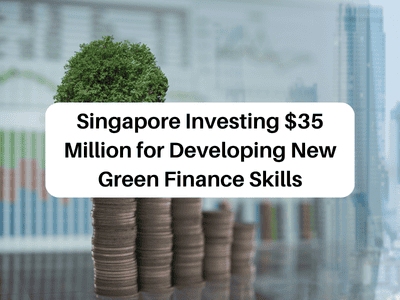Singapore’s Green Finance Boost

ASEAN’s sustainable finance market could reach $4 trillion to $5 trillion in the next 10 years. Financial institutions will play a major role in this push to catapult the nation to a global scale.
What This Means For Singaporean Employees
The biggest call for the region’s sustainable financing is due to three key sectors: energy, construction, and real estate. This translates to a demand for funding in areas such as deploying renewable energy, improving electricity distribution, and making commercial buildings more environmentally friendly. At the Sustainable Finance Jobs Transformation Map’s launch last April, Minister of State for Trade and Industry Alvin Tan stated Singapore is set to become a frontrunner in sustainable finance for Asia. Hence, Minister Tan stressed the need for a skilled workforce to stay competitive in the complex and rapidly evolving sustainable finance field.
MAS, IBF and Workforce Singapore are urging financial service workers to develop new skills in the next three years actively. Minister Tan says over 25 local financial institutions plan to upskill their employees in the next three years.
Over 20 unique job roles are emerging, especially in sales and relationship management. In the Jobs Transformation Map report by KPMG Singapore, these jobs are identified as high-priority roles for upskilling. The report forecasts 4,000 to 5,000 new sustainable finance jobs from risk management to strategy development over the next decade. This reflects the growing importance of sustainability as a core business strategy for financial institutions.
MAS is allocating $35 million from the Financial Sector Development Fund to address the growing demand for specialists in this field. This funding will support professionals in developing critical skills needed for sustainable finance roles. An example of a key technical skill is climate change management. This involves integrating climate risks into a firm’s overall risk management framework. One must also be proficient in identifying opportunities for creating financial products that address climate change adaptation.
Sustainable Finance Education In Singapore
Higher learning institutes in Singapore are increasing their sustainable finance courses. This year alone, institutions like the Singapore Green Finance Centre (SGFC) and the National University of Singapore (NUS) will be launching over 65 new executive courses. Sustainable and Green Finance Institute (SGFIN). This builds on a base of more than 100 sustainable financial courses available in the country currently.
The Singapore Green Finance Centre has launched three online courses on sustainability stewardship, carbon markets and sustainable investment management designed for mid-career professionals. A fourth introductory course on sustainability and sustainable finance, focusing on Asia, will be offered for free to the public to raise awareness. Nanyang Technological University (NTU) and NUS are also setting up undergraduate programmes on sustainable finance; NTU’s innovative Bachelor of Accounting in Sustainable Management program will start its enrollment later this year.
Executive director of the Singapore Green Finance Centre, Ms Nikki Kemp is expanding training course offerings across universities. She focuses on areas such as nature-based solutions and climate science which are crucial for the evolving financial sector. She also advocates for increased resources to build and support local academic expertise in these fields.
Future Green Plans For Singapore
Launched on April 17th, the Asia Centre of Carbon Excellence aims to bring together experts in carbon project development, carbon policy, and capacity-building. Established by South Pole and GenZero, the centre focuses on new approaches to mitigate global greenhouse gas emissions swiftly. This includes exploring the use of carbon credits to scale up and commercialise green hydrogen, a clean fuel. Additionally, the centre will support governments and businesses in utilising carbon markets, allowing them to achieve their national climate targets as per the 2015 Paris Agreement.
Liked what you read? Follow 3E Accounting for more Business News in Singapore.








